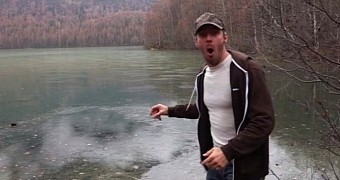Just a few days ago, a guy named Cory Williams shared a video of himself skipping rocks on a frozen lake with the online community. The video, available below, has since been viewed thousands of times.
Apparently, Cory Williams moved to Alaska earlier this year, in August, and is still trying to make heads or Tails of the strange (to him) world he came across there. The footage below is part of a video log that the man is using to document his life in Anchorage.
The “pew pew” noises
Mind you, if you're going to watch the video, you should know that the really cool part doesn't start until 3 minutes and 45 seconds in. That's when Cory Williams starts skipping rocks on the frozen Alaskan lake.
Almost as soon as the rock hits the surface of the water, or, better said, the ice resting on top of it, some really weird “pew pew” sounds are produced. These sounds are similar to the ones made by some of the weapons features in science-fiction movies.
Shortly after this video went viral, some people accused Cory Williams of having modified the sounds in an attempt to get his 15 minutes of fame. Still, there is one man who believes him that the rock really did produce those sounds.
This man is researcher Mark Hamilton, who now works with the University of Texas, Austin, and who is here to tell us that science can totally explain the sounds that Cory Williams and his girlfriend heard when the rock hit the frozen lake.
How acoustics can explain everything
Talking to Live Science, the specialist explained that it all boiled down to acoustics. Specifically, it appears that Cory Williams heard the “pew pew” sounds because, seeing how he threw the rock at a considerable distance, the higher pitches got to him first.
Mark Hamilton says that, when the rock hit the ice, a so-called bending wave formed and sound was radiated into the air. Because he and his girlfriend sat at a considerable distance from the place of impact, the higher pitches were the ones that reached their ears first.
“Stand too close to a stone tossed on ice, and all you'll hear is a simple crack. But if you hurl the stone far away and listen at a distance, the higher tones arrive first, and you hear a downward chirp,” the researcher explained in a statement.
The bad news is that, if you're thinking about recreating Cory William's experience the next time you come across a frozen lake, you might have some problem. This is because the clarity and pitch of the sounds made by such impacts depend on the thickness and the clarity of the ice.

 14 DAY TRIAL //
14 DAY TRIAL // 